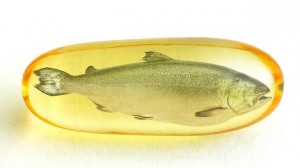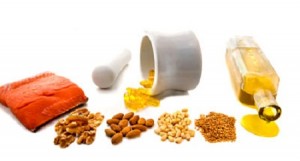Wanna lose weight? Take some Omega-3, Have joint pain? Take Omega-3s, Depressed? Omega-3!! Overweight, underweight, building muscle, slimming down… Omega-3s seem to be the answer to anything and everything. Even though Omega-3 fatty acids have been making headlines, you might not understand why you need them. Are these fats really that amazing? Here’s a rundown of the essential Omega-3 facts every athlete should know. There are three primary types of omega-3 fatty acids that come from foods. These are ALAs, or alpha-linolenic acids, EPAs, eicosapentaenoic acids, or DHAs, or docosahexaenoic acids. Once consumed, the body converts ALA to EPA and DHA, the two kinds of omega-3 fatty acids that can be more readily harnessed and used by the body. Epidemiological studies show that people in Western Countries consume a diet rich in Omega-6, therefore resulting in a disruption of the bodies’ Omega-6/Omega-3 balance. On average, American diets are up to 25 times higher in omega-6s than omega-3s. Scientists attribute an unbalanced diet of Omega-3 and Omega-6 to an increase in chronic inflammation and even cancer. Omega-3s, mostly DHA and EPA, share strong anti-inflammatory properties that function by blocking various signaling pathways in the cell. Omega-3s may enhance cardiovascular health, lower triglycerides, glucose metabolism and regulate immune cells. Researchers demonstrate that Omega-3s have catabolic and anabolic effects.
Omega-3s and fat loss
Supplementing the athlete’s diet with Omega-3s result in an increase rate of fat loss compared to controls who did not  take Omega-3s. A bit confusing. How can you eat fat to lose fat? Physiologically, there are several possible mechanisms by which addition of Omega-3s to the athlete’s diet can result in fat loss. Studies show that Omega-3s can act as appetite suppressants by reducing insulin resistance and affecting the body’s tolerance to glucose. Remember, reducing your insulin levels also means that your body’s preferred fuel becomes fat. Further biochemical studies published a correlation between increased Omega-3s consumption and fat oxidation, or fat loss. Another research group reported that Omega-3s have an effect on hemodynamics. Results from that study illustrate increased blood flow to muscles during exercise with increased Omega-3 consumption which also again increases fat loss.
take Omega-3s. A bit confusing. How can you eat fat to lose fat? Physiologically, there are several possible mechanisms by which addition of Omega-3s to the athlete’s diet can result in fat loss. Studies show that Omega-3s can act as appetite suppressants by reducing insulin resistance and affecting the body’s tolerance to glucose. Remember, reducing your insulin levels also means that your body’s preferred fuel becomes fat. Further biochemical studies published a correlation between increased Omega-3s consumption and fat oxidation, or fat loss. Another research group reported that Omega-3s have an effect on hemodynamics. Results from that study illustrate increased blood flow to muscles during exercise with increased Omega-3 consumption which also again increases fat loss.
Omega-3s and muscle hypertrophy
Loss of muscle is a problem athletes and older individuals face. As previously mentioned, dietary Omega-3s have anabolic properties and can contribute to muscle hypertrophy. The anabolic effects of Omega-3s are noted particularly when ingested in combination with high-protein meals by athletes following a fasting regimen (Intermittent fasting, for example)/post hypoinsulinemia. Omega-3s stimulate muscle protein synthesis (MPS), which may be useful not only for athletes, but also for the prevention and treatment of sarcopenia, or muscle loss associated with aging. Reports of increased anabolic biomarkers expression in response to Omega-3 supplementations, confirm the importance of Omega-3s in muscle hypertrophy. Interestingly, the anabolic biomarkers that were affected by Omega-3s supplementation were the same biomarkers stimulated in response to weight training (Rheb/vps34 expression). A study measuring Leucine resistance (marker of muscle loss/related to aging) shows a decrease in Leucine resistance in response to Omega-3 consumption, therefore suggesting an increase in protein synthesis. Interestingly, muscle protein synthesis rate was increased by ~50%-120% post omega-3 supplementation. That same group reported an increase in the total anabolic signaling pathway (mTOR) in response to Omega-3 consumption post-fasting.
Where can you get Omega-3s from?
Omega-3 fatty acids can be commonly found in fatty fish (salmon, halibut, tuna, sardines, and herring), flaxseeds, pumpkin seeds, and walnuts. 
How much Omega-3s do Athletes need?
The needs are tailored individually but range from 1.5g to 3g of Omega-3s/day. Make sure the omega-3 supplement you purchase has about 120mg of EPA and 180mg DHA on the label, a total of 300 mg/capsule. In that case, you will be needing 2 capsules with each meal or about 10 a day. Seems a lot? If you eat a diet rich in fatty fish such as salmon, you would not need to increase your omega-3s intake.
References
- Omega-3 Fatty Acids EPA and DHA: Health Benefits Throughout Life. Adv Nutr.2012
- Omega-3 polyunsaturated fatty acids augment the muscle protein anabolic response to hyperinsulinaemia–hyperaminoacidaemia in healthy young and middle-aged men and women. Clinical Science. 2011
- Fish oil prevents insulin resistance induced by high-fat feeding in rats. Science. 1987
- Long-chain omega-3 fatty acids regulate bovine whole-body protein metabolism by promoting muscle insulin signalling to the Akt-mTOR-S6K1 pathway and insulin sensitivity. J. Physiol. 2007 1
- Dietary omega-3 fatty acid supplementation increases the rate of muscle protein synthesis in older adults: a randomized controlled trial. Am J Clin Nutr. 2011
BIO
Chantal Charo is an Assistant Professor of Physiology, a Sports Nutritionist and a Medical Writer from Miami, FL. Her interdisciplinary biomedical research particularly focuses on gastrointestinal diseases, such as diabetes, pancreatic cancer and the role of insulin resistance in pathophysiology. Dr. Charo is also involved in numerous clinical trial in her field and has most recently completed a trial on NSAIDs and pancreatic diseases. Chantal earned her Ph.Ds. in Biomedical Sciences and Cancer Biology from the prestigious University of Texas Houston and the UT MD Anderson Cancer Center. As sports nutritionist Dr. Charo has trained with leading supplement companies across the United States by researching ways to target insulin resistance and hormonal balance in women, as well as the Euthyroid Sick syndrome and the female athlete. Chantal hosts a medical segment on a local daily talk show which aims at promoting awareness to women and combating health illiteracy. In support of her research, Chantal has received fellowships from National Cancer Institute, the National Institute of Health and more. She is a Fellow of the American Association of Cancer Researchers, the American Pancreatic Association and the American Breast Cancer Association, and was the recipient for many outstanding scientist awards. The link to Dr. Charo’s sports nutrition clinic is www.facebook.com/sportsnutritionclinic



